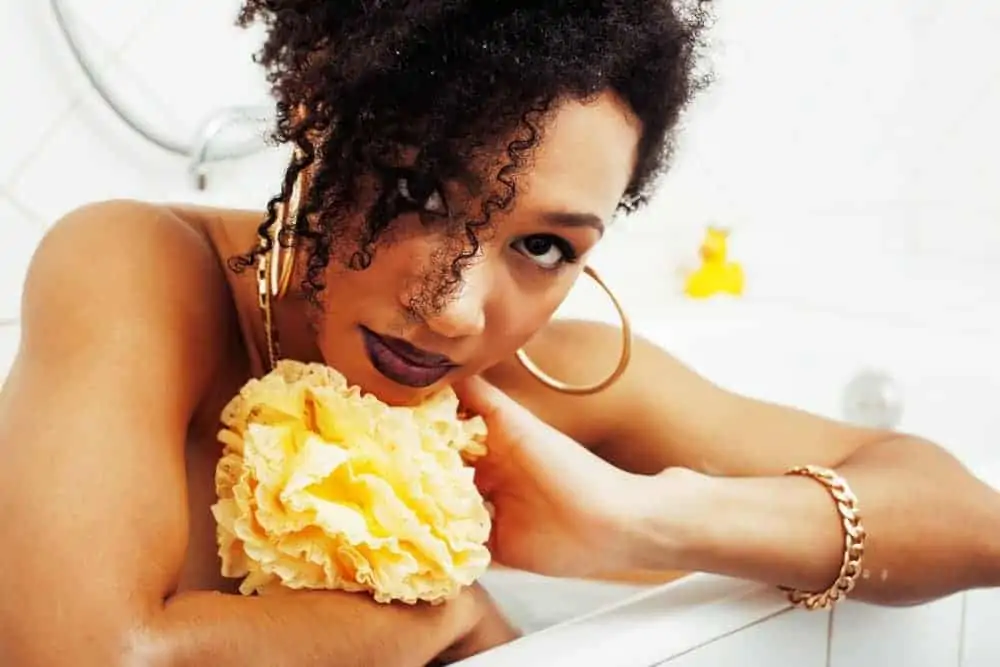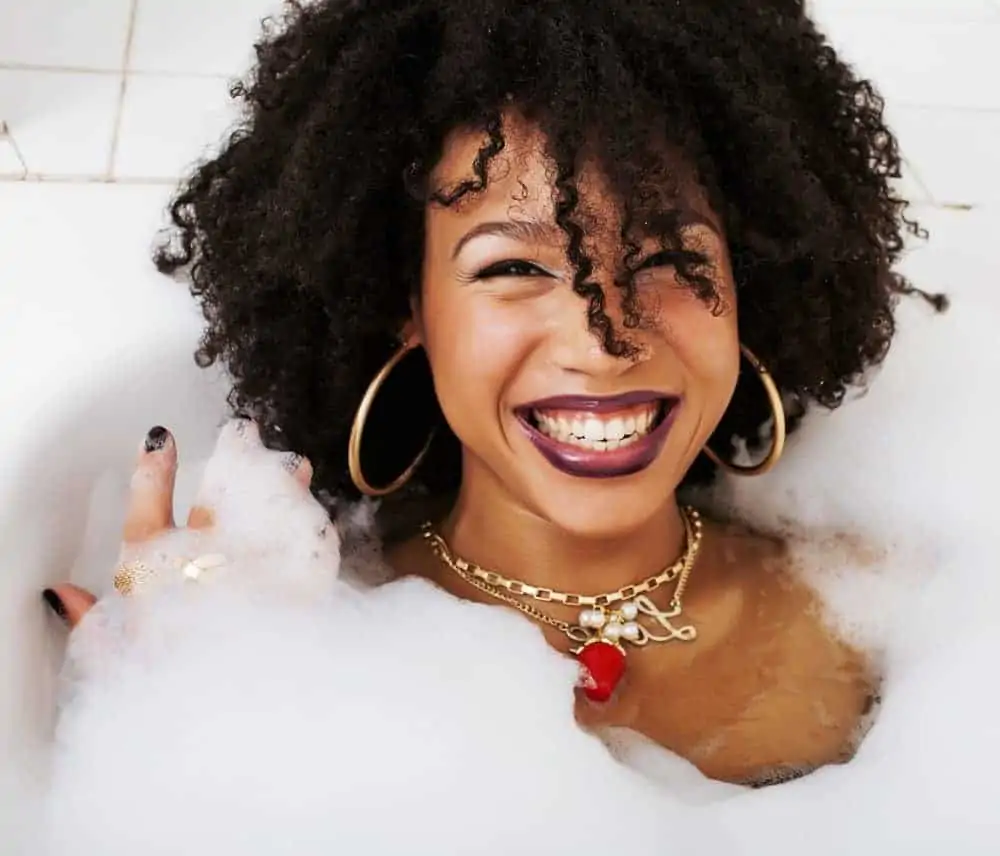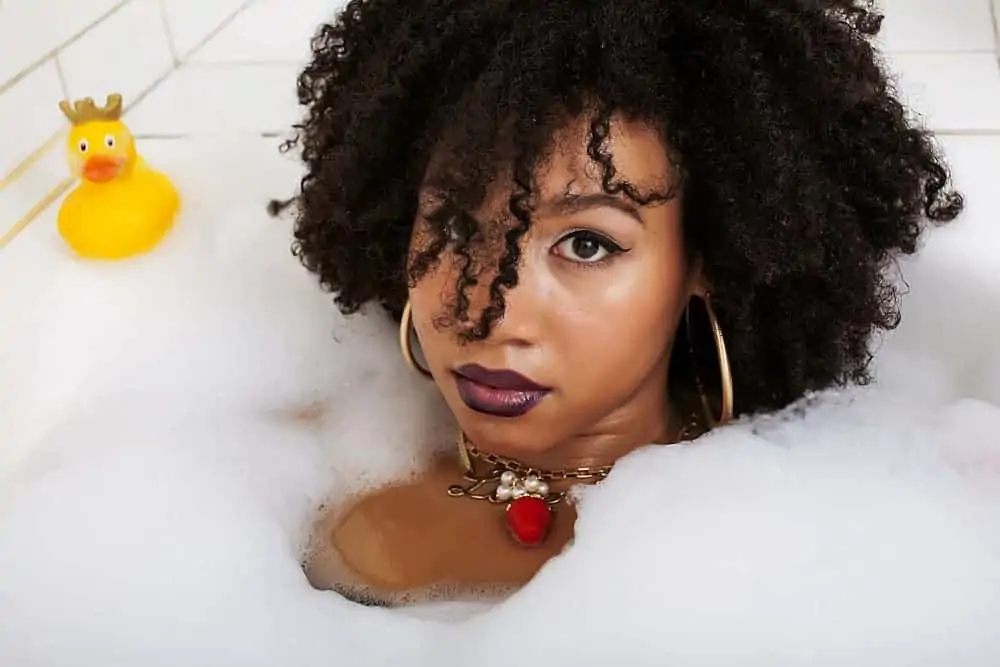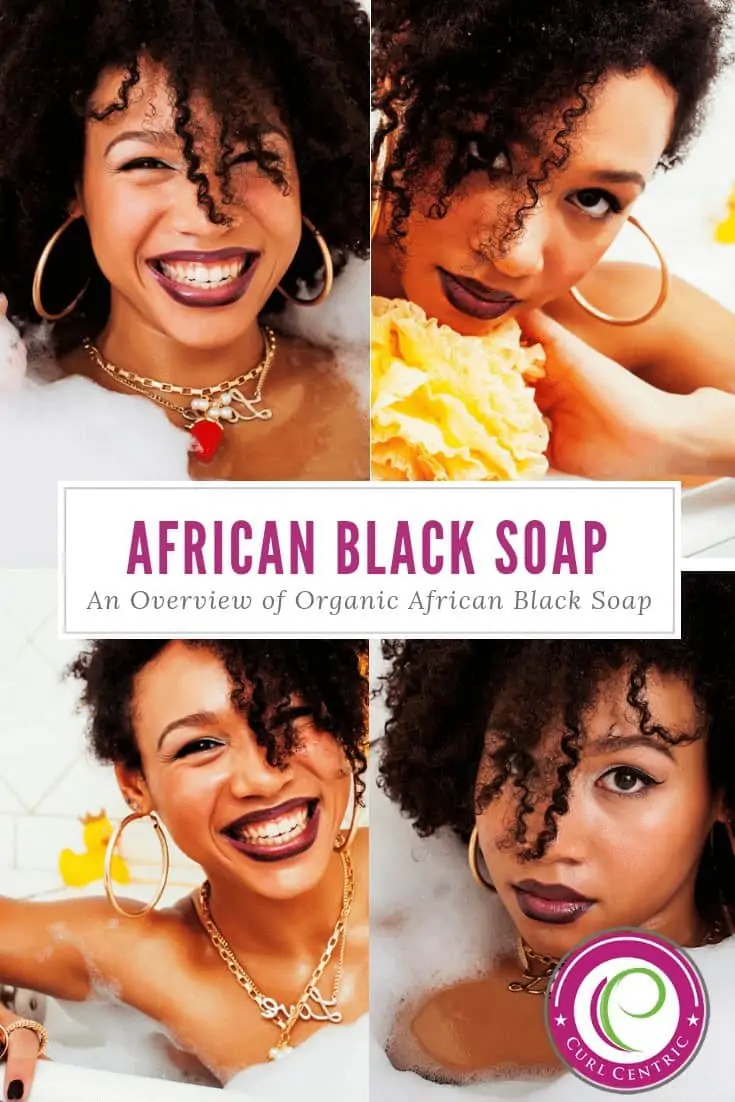
African black soap has been receiving rave reviews in the natural hair community.
Numerous hair bloggers and YouTube vloggers have been singing the soap’s praises.
Lately, several ladies have asked us about African black soap shampoo.
What are the benefits compared to using other types of shampoo?
As per usual, we’ve done the research.
Table of Contents
- 1 Key Takeaways
- 2 What Is African Black Soap?
- 3 Primary Ingredients of African Black Soap Shampoo
- 4 African Black Soap Benefits for Hair
- 5 Does the African Black Soap Dry Out Hair?
- 6 What Makes African Black Soap So Soft?
- 7 What’s the Probability of African Black Soap Causing Dryness?
- 8 How to Make African Shampoo Out of Black Soap?
- 9 General Tips for Using African Black Soap for Hair
- 10 Is African Black Soap Safe for Hair?
Key Takeaways
- African Black Soap’s Composition: Real African black soap, a plant-based soap traditionally used in West Africa, stands out due to its high nutrient content. It’s made from natural ingredients like cocoa pod ash, which is critical for its soothing properties and color, and it lacks toxic substances often found in lab-produced bases.
- Benefits for Skin Conditions: This natural soap is particularly beneficial for various skin types, including sensitive skin and conditions like dry skin, dark spots, and fine lines. Its composition helps improve your skin texture and tone, offering relief from skin issues like eczema and razor bumps.
- Hair and Scalp Health: African black soap bars can be used as shampoo, promoting healthy hair growth and addressing scalp conditions such as dandruff and fungal infections. Its natural oils nourish follicle cells, making it an excellent cleanser for natural hair care.
- Safety and Sensitivity: Always perform a patch test before full use, especially on sensitive skin, to ensure no adverse reactions. Despite its natural composition, individual reactions to ingredients like manganese oxides or unburnt carbon can vary.
- Choosing Authentic Soap: When selecting African black soap, opt for the real thing – raw African black soap – which is free from artificial ingredients and rich in essential nutrients. Traditional African black soap offers a list of benefits due to its authentic and natural formulation.
What Is African Black Soap?
African black soap (also known by names like “Ose Dudu” and “black soap”) is an antibacterial, antifungal, and anti-inflammatory hair remedy that originates from West Africa, and its popularity is rapidly increasing.
It has an unmistakable dark color that comes from the ashes of locally harvested and dried African plants, giving it a distinct brown-to-dark color.
The soap is 100% natural, and it’s rich in vitamin A and vitamin E, and iron oxides, which have some healing properties.

Unlike other hair cleansers that contain synthetic compounds, black soap is loaded with naturally occurring hair growth nutrients like magnesium and potassium. Thanks to locally harvested ingredients such as cassava, cocoa pods, plantains, shea tree bark, and palm tree leaves.
Though once lesser-known, black soap of this kind has even gained notoriety in North America and much of the rest of the world. African Black Soap is now a popular beauty product that has seen widespread use over the years.
In West African countries like Ghana, black soap is typically made by local women and then put up for fair trade. Unique family recipes that have been passed down through the generations are often used.
The process of making this soap is quite involving. The locally harvested plant leaves and peels, e.g., plantain peels, are sun-dried. The skins or palm leaves and cocoa pods are added and then roasted in clay to produce ash. Water is then added to the ashes before filtering.
The other ingredients like coconut oil, shea butter, cocoa butter, or palm kernel oil are heated, added then stirred for up to 24 hours. The soap then solidifies, moving to the top where it’s scooped out and left out to cure for two weeks. At this point, the African back soap is ready for sale.
Black soap is very gentle, making it ideal for people with skin issues such as rashes, rosacea, or eczema. The plantain extract often used in the production of black soap also has useful antibacterial properties, making it a viable option for acne treatment as well. It can even be used as a hair shampoo.

Primary Ingredients of African Black Soap Shampoo
It’s easy to take products like soap and shampoo for granted, but there’s a lot more to them than you might think.
In general, soap is made by a rather intricate process known as saponification. This revolves greatly around the use of oil and lye, the latter of which is almost always sodium hydroxide.
African black soap is really no different from most soaps in that general regard, but the lye used is actually potash (which is derived from plant ash) instead.
The benefit to potash comes in its rich potassium carbonate, the result of which makes for a gentler lye.
Plants that are often used for this originate in various locales from West Africa, but they are all completely natural and in full supply. Examples include cocoa pods, ground nutshells, palm leaves, and plantain skins.
But what is it about this soap that makes it unique, and why should you consider it one of the main products in your hair care and maintenance routine?
Let’s find out in the subsequent sections.
African Black Soap Benefits for Hair
What does African Black Soap do for your hair? The natural ingredients found in African black soap are responsible for the many benefits this soap offers. Depending on the specific part of West Africa where the soap was made, the ingredients may vary slightly.
Some may contain essential oils such as eucalyptus, while others may have oatmeal or aloe vera gel. Either way, black soap contains powerful cleansing properties and essential minerals and vitamins to promote the faster growth of healthy, strong hair.
Below are the benefits of African black soap for natural hair:
1. Promotes Faster Hair Growth
The plantain skins and leaves in African black soap contain a high concentration of vitamins A and E, which are great for the scalp. Vitamin E contains antioxidants that reduce the amount of oxidative stress and free radicals, known to cause the hair follicles to break down.
On the other hand, vitamin A helps the skin glands to make an oily substance called sebum which moisturizes the scalp, keeping the hair healthy. These two nutrients promote the growth of thicker and longer hair.
2. Combat Aging of the Hair Follicles
The antioxidants found in African black soap help combat the aging of the hair follicles. These antioxidants come from cocoa pods which are rich in methylxanthines and polyphenols.
The high oil and glycerin content also make African black soap the ideal cleanser for keeping your scalp and hair clean, soft, and moisturized.
Another benefit of using this soap is that it doesn’t leave your hair strands dry or hard as the synthetic shampoos in the marketplace.
3. Deep Cleanses the Scalp
African black soap is antifungal, antibacterial, and antiviral, hence a potent cleansing agent for your scalp. This soap is also an excellent remedy for hair loss and other conditions like eczema and itchy scalp.
African black soap is also thought to remove more bacteria than most chemical cleaners, and despite its strength, the soap is gentle to your scalp, skin, and softens hair.
4. Increases Hair Growth
A buildup of dead skin cells, excess oil, and dirt can obstruct blood flow under the skin, limiting nutrients to the hair follicles. This results in thinning and unhealthy hair.
By scrapping the scalp with black soap, you create a healthy environment that allows vitamins, iron oxides, and essential oils to penetrate the hair shaft.
African black soap also promotes rapid hair growth by increasing blood circulation of the scalp. A 2001 study done on mice found a connection between blood flow and hair growth.
According to the research, promoting blood vessel growth led to a rapid increase in hair volume by up to 70%. The reason is that increased blood flow causes better circulation of nutrients and oxygen.
These two components are vital for the growth and maintenance of strong and healthy hair.
Does the African Black Soap Dry Out Hair?
Unlike synthetic soaps and shampoos, African black soap won’t dry your hair; in fact, it softens it. Cocoa butter found in African black soap is a natural fat that has been used for years as a hair moisturizer.
It also contains vitamins A and E, which fights aging signs, helping your hair look fresh and healthy. After washing your scalp and hair using African black soap, it’s recommended to use a conditioner to help detangle the hair strands and maintain the hairstyle.

What Makes African Black Soap So Soft?
For some, it’s quite difficult to find a brand of soap that actually seems soft or moisturizing. Soap has a naturally high pH, and some people are simply more sensitive to it.
There are a few key differences present when it comes to African black soap.
- The lye’s gentler nature, as mentioned above, is one of the key differences. This helps the final product moisturize more easily since it will maintain more natural oil.
- In direct contrast to most other soaps, the oils used in the saponification process are unrefined.

What’s the Probability of African Black Soap Causing Dryness?
If you intend to use African black soap shampoo on your hair, you need to know a few things. First of all, you may experience some temporary dryness, but using a conditioner afterward will usually fix this issue.
If you already have a lot of trouble with your hair drying out, you may need to use shikakai shampoo or a different hair product. Although, you could still use African black soap to clarify your hair.
African Black Soap Shampoo Recipe
In this video, Whitney White demonstrates how to create a simple, natural African black soap shampoo designed to clean your hair while leaving it hydrated. The formula, which is perfect for homemade DIY enthusiasts, contains African black soap and a blend of essential oils and other products that are genuinely good for your hair.
If you’d like to create this homemade shampoo, you’ll need to combine the soap with some water, tea tree oil, and a bit of sweet almond essential oil. Once you’ve blended the ingredients together, apply them directly to your wet hair and work the shampoo into a lather.
Pay close attention to the roots of the hair and then work your way down to the ends, making sure to get a generous amount of shampoo throughout your hair.
Many people love using African black soap shampoo because it’s a natural product that genuinely works for a lot of women. It contains different vitamins and antioxidants that can protect the skin and the scalp.
Tea tree oil is a product that some people think encourages faster hair growth while eliminating the excess oils that may be in the hair. We haven’t found evidence that tea tree oil makes your hair grow faster. However, there are plenty of benefits to using oil.

How to Make African Shampoo Out of Black Soap?
If you are looking to make a shampoo out of African black soap, all you need are a couple of other ingredients and a few steps to help you make a ready-to-use natural shampoo, which will cleanse and enrich your scalp and hair with all the essential oils and nutrients.
DIY Homemade Natural Shampoo for Hair and Skin
Ingredients:
- Bar of African black soap
- 1 tablespoon Glycerin
- 1 cup of distilled water
- 10 drops of Tea tree oil
- 1 tablespoon of Vitamin E oil
- 5 tablespoons of Jojoba oil
- 1/2 tablespoon of Argan Oil
- 10 drops of rosemary essential oil
- 10 drops of peppermint essential oil
- 10 drops of Lavender essential oil
- Diluted apple cider vinegar (ACV)
Directions:
- Cut or grate a 1/3 portion of a 3 oz. (84 grams), bar of African black soap and shave it down with a knife into a jar, preferably with an airtight lid. While the measurements don’t have to be exact, the smaller the shavings, the faster they will dissolve. You can also chop the 3 oz. block into three bars of 1 oz. (28 grams) and keep the other bars for future use.
- Boil your distilled water, then let it cool to a slightly warmer than room temperature.
- Add the warm water to the soap shavings. For a thick consistency, use less water; otherwise, add slightly more water for a thinner solution. It all depends on your preference.
- Allow the soap to dissolve, and you’ll have an even soap and water mixture. While you can use this mixture the way it is, it can be a bit drying. If you want a softer and moisturized feel on your hair, you want to add all the other ingredients except apple cider vinegar (ACV). Some of the oils, such as peppermint oil, have been studied and shown to promote hair growth. On the other hand, rosemary oil is known to stimulate hair growth and increase blood circulation.
- Using the airtight lid jar, shake the mixture occasionally until you get a fine and even solution. A lid that is tightly sealed allows you to thoroughly and comfortably shake the mixture once you’ve added in your favorite oils. This may take upwards of 30 minutes. Note: Some women use olive oil or castor oil during this step, which is perfectly fine as well.
- Once everything has dissolved completely, transfer the mixture to an easy-to-use applicator bottle, and now you have your natural African black soap shampoo.
- Apply the shampoo to your scalp and gently massage it into your hair strands.
- Use the diluted Apple Cider Vinegar for the final rinse (i.e., ACV rinse). African black soap is a bit more alkaline, and since ACV is acidic, it will help regulate your scalp’s pH. However, if you don’t have ACV or do not like using it, you can rinse your hair with cool water instead.
- Use your favorite conditioner and style your hair as usual. This is because the shampoo will tend to leave your hair strands tangled. Conditioning your hair after a thorough cleaning will put your hair back to form as they contain detanglers.
General Tips for Using African Black Soap for Hair
African black soap is a time-honored and all-purpose beauty product used for both skin and hair. As a hair-care product, you can use the soap alone instead of synthetic/chemical-based shampoos or make a DIY black soap shampoo out of it.
If you’re using African black soap instead of shampoo, pinch or cut off a small piece and wet it before rubbing it to create a lather. African black soap has coconut oil and palm kernel oil, which contain lauric acid.
The latter creates a natural foamy lather on your hair. However, both the soap and the DIY black soap shampoo may not lather as much as the commercial shampoos.
The DIY shampoo is very effective at removing oils or dirt from your scalp, and it’s best to limit its use to every two to three washes. After weeks of regular use, you’ll notice some differences in the thickness of your hair, as well as how it retains moisture.
After using the black soap alone or the DIY shampoo on your hair, you may experience some dryness. Using a conditioner afterward will help fix this issue.
As a rule of thumb, always store the soap in an airtight bag or sealed plastic container. You can also prolong the life of African black soap by keeping it in a sealed container.
Leaving this soap exposed to air will harden it, making it difficult to use. Additionally, the soap may develop a white film, which is normal and won’t affect its quality.
Is African Black Soap Safe for Hair?
African black soap packs a ton of powerful nutrients, all of which have been studied and shown to enrich the scalp and boost hair growth. While the soap tends to be safe for most people, the possibility of an allergic reaction, such as scalp sensitivity or dryness, cannot be ruled out.
There are also many fake or counterfeit African black soaps in the market, and you should always look for authentic products from reputed stores or cosmetic suppliers. Also, be keen to read the product labels and find out all the ingredients labeled against the soap.
Authentic black soap is all-natural with no dyes or fragrances. Below are some tips on how to identify a genuine from a fake African black soap:
- A synthetic or fake African black soap has a non-natural black color and is often very hard. The texture looks like that of a synthetic soap, and the surface is shiny or smooth. If the soap doesn’t dissolve easily, then there is a high chance it’s a counterfeit.
- An authentic African black soap is almost crumbly and soft with a light to dark brown appearance, depending on the roast. The soap has more texture than synthetic soaps, and it’s often multicolored. It will also dissolve faster in water, and you can easily shape and mold the soap in your hands.
Before using African black soap on your scalp and hair, you want to do a test patch on the less sensitive parts, such as the underside of your arm. If there’s no severe tingling sensation or burns, you can then apply it to your hair.
In case you used an authentic African black soap with all the right recipes when making the shampoo but still experienced unwanted side effects, it’s a good idea to discontinue use.
As one of the popular hair-care products in the marketplace, African black soap has a lot to offer as far as skin, scalp, and hair health are concerned.
This soap has worked for many women looking to up their hair game, thanks to the different antioxidants, cleansing compounds, and vitamins that protect the scalp and create the perfect environment for faster growth of healthy, beautiful, and strong hair.
When applying the African black shampoo to your hair and scalp, always pay attention to the hair base or roots. Massage your scalp gently, then work the shampoo throughout your hair strands, making sure the strands get a generous amount of the shampoo.
Achieving your hair goals with African black soap begins with choosing an authentic product from a reputed cosmetic or convenience store.
The essential oils and ingredients needed to make the DIY shampoo are a must-have for the best results, but if you can’t find some or don’t like using them, you will still notice some difference in your hair.
The homemade shampoo is easy to use and will leave your hair feeling clean and nourished. Regardless of your hair type, this is an excellent alternative to the commercial shampoos available in the market.
You can always try African black soap and check if it works for you. And the best part – it’s all-natural, safe, and highly potent.

